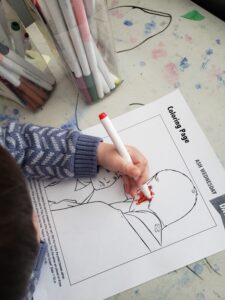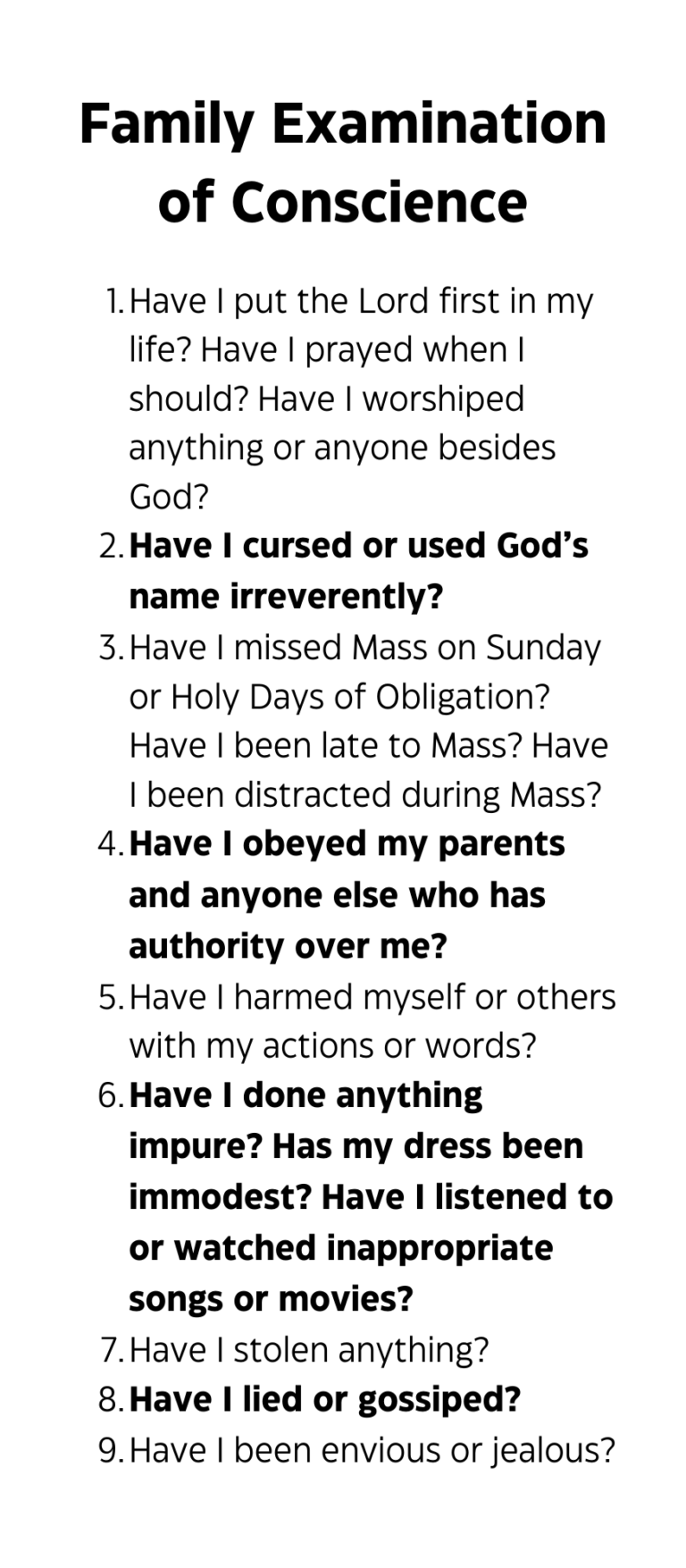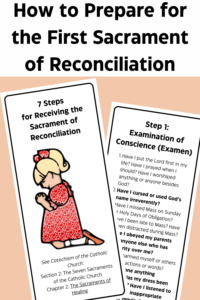Sharing is caring!
How to Prepare Children for the First Sacrament of Reconciliation
This post was updated on July 13, 2025.
Receiving the First Sacrament of Reconciliation is a blessed time in every parent’s and child’s life. Preparing to receive this beautiful sacrament is very important.
Your child may be attending religious education, or your child may be attending Catholic school.
Either way, it is the parents’ responsibility to teach their children their faith. As parents, we made the promise at our child’s baptism to raise him or her in the faith. This means teaching our children the faith, and, especially, preparing them to receive the sacraments.
Now, I will explain how to prepare your child to receive the First Sacrament of Reconciliation step by step.

What is the First Sacrament of Reconciliation?
According to the Catechism of the Catholic church:
“ Christ instituted the sacrament of Penance for all sinful members of his Church: above all for those who, since Baptism, have fallen into grave sin, and have thus lost their baptismal grace and wounded ecclesial communion. It is to them that the sacrament of Penance offers a new possibility to convert and to recover the grace of justification. The Fathers of the Church present this sacrament as “the second plank [of salvation] after the shipwreck which is the loss of grace.” CCC 1446
Wow! How good is God to allow us to purify our soul with this amazing sacrament? You can read more details about the sacrament of Reconciliation (also know as “Penance” or “Confession”) in the Catechism of the Catholic Church starting at CCC 1440. The “First Sacrament of Penance” is the first time a person receives this sacrament in his or her life.
Children are usually eligible to receive the sacrament “at the age of reason”. The church considers this to be around 7 or 8 years old.
Also, the child must have had sufficient teaching and formation in the faith. This is where you come in!
How to Prepare Children for the First Sacrament of Reconciliation
Ideally, preparation for First Reconciliation should start at birth! Then, the preparation will continue until the child reaches the age of reason (usually 7 or 8 years old) as determined by the Catholic church.
I will now show you how to prepare your child to receive the sacrament of Penance. We will start with what you can do right from the day your child is born.
From Birth
Take them to Mass
1. Take them to Mass: The third commandment tells us to honor the Lord’s day which means that Catholics must attend Mass every Sunday. So, as parents we must go to Mass. Technically, children under the age of reason do not have to attend Mass. However, the sooner and more often you take your children to Mass the better. I recommend taking them every Sunday.
Pray
2. Pray with and for your children: You can actually start praying for your children in the womb! After they are born, continue to pray for them everyday. Ask God to protect them from physical and spiritual harm. Pray with them every morning when they wake up and every night before bed. Pray the Our Father, Hail Mary, and Glory Be. Pray the rosary while you feed them and play with them. Work towards praying the rosary every night as a family. Start with 1 decade per night and work up to 10!
Live Liturgically
3. Live liturgically in the home: This is my favorite way to teach the faith! Besides celebrating Christmas and Easter, celebrate other feasts in the church. You may wish to start with St. Nicholas Day during Advent. Or, choose another of the many Advent saints to celebrate. Lent is also a beautiful and holy season in the church. I have lots of Holy Week ideas to help your family live liturgically!

Receive the Sacrament of Reconciliation
4. Receive the Sacrament of Reconciliation frequently: Receive the Sacrament of Reconciliation as frequently as possible. It is a very good practice to receive this sacrament every month. In fact, as Catholic, we must receive this sacrament at least once a year.
According to the Catechism of the Catholic Church, “The second precept (“You should confess your sins at least once a year”) ensures preparation for the Eucharist by the reception of the sacrament of reconciliation, which continues Baptism’s work of conversion and forgiveness.” CCC 2042
If you haven’t received the sacrament in a while, you should go as soon as possible. You will be fulfilling your obligation to the 2nd precept (which are given to us for our good), and you will be setting a wonderful example for your children.
Teach the faith
5. Formally teach them the faith: Along with the previous steps mentioned, you should formally teach your children the faith via the Bible, Catechism, and lives of the Saints. Set aside time everyday to read your child the Bible and the Catechism. The simplest Catechisms to read to children are The New St. Joseph First Communion Catechism and the Baltimore Catechism No. 1.


Ages 3-4
1. Continue completing the tasks in the previous “From Birth” section.
Basic Prayers to Learn
2. Teach them all of their basic prayers (Our Father, Hail Mary, Glory Be). These can be found in the catechism books mentioned above.
Jesus' True Presence in the Eucharist.
3. Talk to them about Jesus’ True Presence in the Eucharist.
According to CCC 1324, ” The Eucharist is ‘the source and summit of Christian life.’ “The other sacraments, and indeed all ecclesiastical ministries and works of the apostolate, are bound up with the Eucharist and are oriented toward it. For in the blessed Eucharist is contained the whole spiritual good of the Church, namely Christ himself, our Pasch.”
Jesus truly is present in the Eucharist! We should start discussing this with our Catholic children from a young age, so that they can ponder this mystery their whole lives. During the Consecration at Mass, we can point out the priest elevating the host which is really Jesus!
We can also show great reverence and respect when we ourselves receive Jesus in the Eucharist during Holy Communion.
We also need to go to Confession to make sure our soul is as pure as possible to that Jesus may dwell in us.
After you receive Communion, kneel and pray in your pew in thanksgiving for as long as possible. After Mass, kneel and pray again to thank God for His abundant blessings – especially Jesus coming to us in the Eucharist!
Teach them about the Mass
4. Teach them about the Mass. Before Mass, talk to your children about what they will see and hear. Ask them to spot the tabernacle, altar, and sanctuary lamp. Ask them what color the priest is wearing and explain to them why. This board book and this one are great for toddlers to learn about the Mass. This one is great for the Traditional Latin Mass.
Be sure to grab your free Mass cards below to help teach your toddler about the Mass!
Ages 5-6 (or 1 year before they receive the First Sacrament of Reconciliation)
1. Continue completing the tasks in the previous “From Birth” and “Ages 3-4” sections. Continue praying basic prayers together daily.
The Act of Contrition
2. Teach them the Act of Contrition. The Act of Contrition can be found in any catechism.
Simply pray the Act of Contrition together everyday to help your child memorize it. You could add it to night time prayers, and then gradually add time for a family examine.
The 10 Commandments
3. Help them memorize the 10 Commandments.
The 10 Commandments were given to Moses to help guide His people. God gave them to us for our good, and Catholics are still expected to follow them today. When we break a commandment we sin. Sin is separation from God.
The 10 Commandments are guides to keep us on the path to heaven and keep us from straying from God.
At this stage, a child is ready to learn about the 10 commandments.
Throughout this year and next, you should discuss what each means for a child. For example, the 5th Commandment is “Thou shall not kill.” You can explain to a child that this means that we should not harm others or ourselves with our words or actions.
This is a great book that breaks down each commandment for children.

The Catechism
4. Teach them the Catholic Faith using the Catechism: Now is a great time to not only read your child the Catechism cover to cover, but to also help them memorize the questions and answers.
Try using flashcards for the New St. Joseph First Communion Catechism or the Baltimore Catechism No. 1 to help your child memorize and learn the faith.
Ages 7-8 (or the year they will receive the First Sacrament of Reconciliation)
1. Continue completing the tasks in the previous “From Birth”, “Ages 3-4”, and “Ages 5-6” sections. Continue praying basic prayers together daily.
2. Say the Act of Contrition Daily.
3. Continue to review the 10 Commandments and discuss how each one may apply to your child. This will help with the next step which is…
Examination of Conscience
4. Do a daily Examination of Conscience together as a family. An examination of conscience (also called an “examen”) is crucial before Confession. It allows you to reflect on what has separated you from God and determine exactly what to confess.
Practice
5. Practice the steps for Confession. Below are the steps outlined for confession. You can also find a script here in my Reconciliation Preparation pack. The parent can read the part of the priest while the child pretends to go to Confession. Practice this everyday leading up to your child’s First Reconciliation.
Continue Catechism Instruction
6. Continue to teach them the Catholic Faith using the Catechism. Read and discuss it again from the beginning if you have already read it once.
At this point, your child may like to read the Catechism independently.
For an extra challenge and more detail, you can also move to the New St. Joseph Baltimore Catechism No. 1 or the Baltimore Catechism 2.
Bible Study
7. Deepen your child’s bible study. You can do this a number of ways.
Your first option is to use a book like this. Read it together and discuss it daily.
You can also read or listen to the daily Mass readings together and discuss them. I love the Amen App for this.
Better yet, attend daily Mass as much as possible! Discuss the readings before and/or after Mass.

Eucharistic Adoration
8. Attend Eucharistic Adoration. Spending time with Our Lord in the Blessed Sacrament will do wonders to prepare your child’s soul to receive the Sacrament of Reconciliation.
7 Steps for Receiving the Sacrament of Reconciliation
To receive the Sacrament of Penance you must:
1. Examine your conscience.
2. Be truly sorry for your sins (complete contrition).
3. Determine not to sin again.
4. Confess your sins to a priest in the Sacrament of Penance.
5. Do the penance given by the priest.
During the year that your child will receive the sacrament of Reconciliation, start practicing the following steps daily.
These are the steps that your child will use throughout his or her entire life when receiving the sacrament.
I have also created some handy cards to help your child prepare for his or her First Sacrament of Reconciliation! Simply print, laminate and cut. You can keep them from getting lost by punching a hole and putting them on a binder ring or piece of yarn.
Receiving the Sacrament of Reconciliation in 7 Easy Steps
Step 1: Examination of Conscience
Pray to the Holy Spirit to reveal what since you need to confess. Do this before heading off to church. Below, is a simple Examen appropriate for your entire family. Be sure to note how many times you committed each sin, if applicable. You can also write down what you would like to confess and bring it with you. Then, be sure to tear it up afterwards and throw it away. Or, use the laminated card in the Reconciliation set to simply wipe them away after Confession!

Step 2: Entering the Confessional
When it is your turn, enter the confessional and kneel at the kneeler facing the screen. Alternatively, you can sit in a chair usually provided.
Start your confession by doing the Sign of the Cross and saying out loud:
“In the name of the Father, and of the Son, and of the Holy Spirit. Amen.
Bless my Father, for I have sinned. It it my first confession (or, it has been XX days, weeks, months, or years since my last confession). Here are my sins.”
3. Confessing Your Sins
Now, confess your sins in the order of the 10 commandments and tell how many times you committed each sin, if possible.
For example, “I missed Mass twice on 2 Sundays” or “I cheated 3 times in math class.”
Then, say:
“I am truly sorry for these sins and any others that I have forgotten.”
4. Receiving your Penance
Next, the priest may offer a word of advice or counsel. He will also give you your penance.
Your penance may be 1 Hail Mary or 3 Our Fathers, etc. It could even be to apologize to the person who you hurt.

5. Act of Contrition
Now, the priest will ask you to say the Act of contrition. Be sure to say it from your heart. You are talking directly to God when you go to confession. God is forgiving you through the priest, and you are receiving grace from God when you receive this sacrament!
6. Receiving Absolution
Next, bow your head as the priest says the Absolution. The priest will say:
“God, the Father of mercies, through the death and resurrection of his Son has reconciled the world to himself and sent the Holy Spirit among us for the forgiveness of sins; through the ministry of the Church, may God give you pardon and peace, and I absolve you from your sins in the name of the Father, and of the Son, and of the Holy Spirit.”
After making the Sign of the Cross with the priest, and you should reply:
“Amen.”
The priest may say a few more closing words, followed by “Go in peace.”
You respond:
“Thanks be to God.”
Thank Father and then leave the confessional.
Rejoice! Your soul is as clean as the day of your baptism!
7. Prayers of thanksgiving and penance after Confession
After you leave, spend a few moments in prayer. Thank God for His mercy and forgiveness.
Complete your penance immediately or as soon as possible.
Receive the Sacrament of Reconciliation Often as a Family
After your child receives his or her first sacrament of Reconciliation be sure it is not the last! In fact, one of the precepts of the church is to receive the Sacrament of Penance at last once a year.
Your entire family can now go to confession together. The grace for going to confession as a family is amazing!
What other questions do you have about confession? Please leave them in the comments!
Pin it for later

Sharing is caring!

